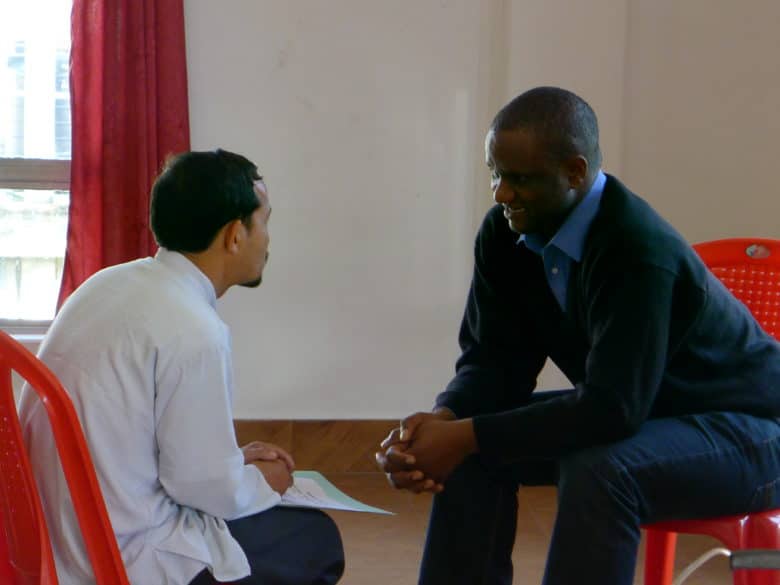Morale was at an all-time low. My European friends were participants at a Harvest Multiplication Training event I helped organize in North India. Though the training was practical, my friends wondered if this—or anything—would help them in their setting. They had worked for over 15 years within an Unreached People Group in South Asia, yet still had seen no fruit.
Together we hoped that follow-up coaching after this training would make a difference. In my organization’s Frontier Missions work, we have discovered the power of combining effective training with mentoring and/or coaching.
So we made a commitment to talk every two or three weeks for an hour, focusing on putting DMM principles into practice. After three months of follow-up coaching, they asked me to continue as their coach. Our relationship has grown over the years even though we are now on opposite sides of the planet.
It’s working! More accurately, Jesus is working, and they joyfully work at His side.
Gathering into a Group
One morning, we talked about plans to gather the new disciples into a fellowship and help them catch a vision for making disciples and reproducing more new fellowships. Toward the end of our call, suddenly they received a text message from a very new believer.
The text said, “Today I shared my personal story and the Gospel story with 3 people. All three want to come to our fellowship now. One of them already wants to follow Jesus!”
We quickly finished our coaching call so they could text this believer and arrange to have breakfast together. They would plan what they would do next.
Now, nearly every call is filled with rejoicing. Their disciples are boldly sharing their faith, praying for and seeing healings, and casting out demons. They are making disciples who are making disciples. Fellowships are forming. Though it’s still in the early stage, a movement is emerging.
Here’s what they wrote to me:
“Coaching is a time for us to look at where we are and where we want to head. Talking with you allows us the chance to reflect. An opportunity to evaluate. You helped us to put our dream for these people into words. Your positive responses to us and your encouragement help us believe it can work! ”
What are the basics of the leadership coaching I use? I call it…
Barnabas-Style Coaching
It is what I model and what I pass on to new coaches and mentors. With my eyes upon Disciple Making Movements, I always aim for my work to be “KISSED” (Keeping It Small, Simple, Easily Duplicated). My desire is that those newly emerging leaders, on the growing edge of a movement, can easily understand and apply basic coaching skills.
Barnabas-Style Coaching comes wrapped up in a simple, two-sentence Bible story about Barnabas.
“When he arrived and saw the evidence of the grace of God, he was glad and encouraged them all to remain true to the Lord with all their hearts. He was a good man, full of the Holy Spirit and faith, and a great number of people were brought to the Lord.”
Acts 11:23-24 NIV
A little background will help. It was the first-century AD: the church at Jerusalem received amazing news. Gentiles in Antioch were hearing the Gospel and turning to the Lord in great numbers. A Disciple-Making Movement was underway! The Apostles decided to send help. Barnabas, whom they nicknamed “the son of encouragement” was their choice. His assignment was to go equip and encourage these new believers to press forward.
Barnabas’ response to the opportunities in Antioch provides us with a wonderful example of a fruitful worker in the harvest. The terms “missionary” and “coach” are not found in the New Testament, but in today’s language, we would call Barnabas a good example of both. Using him as our model, we see the role of an effective missionary and leadership coach.
In my own work as a missionary, I’ve benefited greatly from professional leadership coaching. I have also completed professional-level coach training. However, any of us can learn the simple basics of coaching and use them to build up and multiply leaders to advance the Kingdom of God.
In Acts 11:23-24, I see simple, basic Barnabas-Style Coaching Tips demonstrated for us. They are as easy as 1,2,3:
1) Ask questions
2) Listen carefully
3) Encourage progress.
Barnabas-Style Coaching Tip #1: Ask Questions
“When he arrived…”
Barnabas arrived with anticipation. He was eager to ask questions, looking for signs of the Holy Spirit’s work among the Gentiles of Antioch. Leadership coaching starts by simply “showing up.” Good coaches do not arrive with all the answers; we come with the desire to learn. We listen and watch, expecting to find evidence of where God is at work.
Effective coaches hold a commitment to help another leader or potential leader make progress. Therefore, they ask the kinds of questions which help them to learn more about who the leader is, what the leader does and hopes to accomplish.
“The purposes of a man’s heart are deep waters, but a man of understanding draws them out.” (Proverbs 20:5)
Draw Out What Is Important
Good questions help leaders reach deep inside themselves to draw out what is really important. Relevant questions increase the leader’s awareness. We ask, “What is really happening here? What do you believe God may be saying?” The leader’s response often promotes action toward what needs to happen next.
Draw out the leader’s thoughts and feelings about situations by asking good questions. Asking questions such as, “What do you think about that subject?” or “How did you feel when that happened?” help the coach stay quiet and also avoid feeling pressured to give quick answers or uninvited advice. We keep from answering our own questions…we wait for them. Productive coaching sessions are focused upon the leader, not the coach.
Once the leader’s thoughts have been fully expressed our input may be appropriate. We can refer them back to keys they learned in their training, help them discover new tools/resources, offer personal advice, etc. There is time for this. However, keep in mind some of the best teaching comes through asking the right questions. Remember, Jesus frequently made use of questions as He taught. In the Gospel of Mark, Jesus asked over 50 questions. Asking His disciples, “Whom do you say I am?” led Peter to a life-changing realization. Rather than telling, Jesus asked.
Open-Ended Questions
Jesus’ question was “open-ended,” meaning it could not be answered with one word or a simple yes or no. Peter really had to think about what he believed. In addition to being open-ended, here are some other qualities of good questions:
- Easy to understand
- Require thought and reflection
- Encourage feelings to be expressed
- Flow from the leader’s previous statements
To get the best response, start questions with words such as: what, how, who, when, where or which. Be cautious with the word “why” because it can easily sound like you are questioning motives. The questioning of motives often leads to judgmentalism.
Always include questions that demonstrate you value the whole person, not just their work. Keep listening and responding with genuine care.
Good questions, asked the right way, are tools that uncover precious hidden treasure. Those treasures will help empower the leader in making his or her best contributions toward launching transformational disciple-making movements.
What about the other two Barnabas-Style Coaching Tips? They come with the second part of this article to be published soon.
We would love to hear how you are using coaching with those you disciple and train. Share your experiences on the Disciple Making Movements Facebook group or in the comments below.
Need the kind of DMM coaching Kevin describes? Join our online course and apply for the coaching program.
*The above article is a guest blog contribution written by Kevin Sutter who serves as a coach in the Getting Started in Disciple Making Movements Online Course.




Comments
It’s very true inorder to see DMM we needs coaching / Mentoring to leader and train them to train others believers.
This style, i like it
I am encouraged and can feel the effectiveness of this style of coaching. sure, its best for adoption
It’s challenging but exciting to get involve in a new learning experience.
Need to know your programme
Author
Are there particular questions we can answer about it?